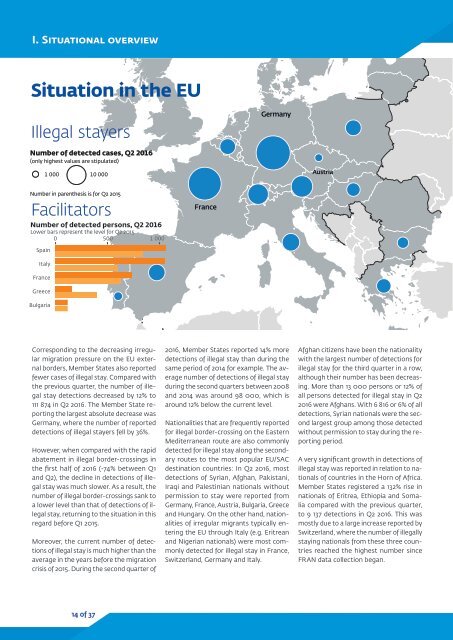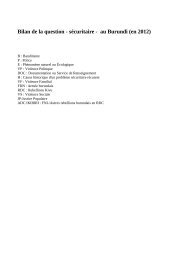Q3 Q4
g8iBkai
g8iBkai
Create successful ePaper yourself
Turn your PDF publications into a flip-book with our unique Google optimized e-Paper software.
!(<br />
Featured I. Situational Risk Analyses overview<br />
Situation in the EU<br />
Illegal stayers<br />
Number of detected cases, Q2 2016<br />
(only highest values are stipulated)<br />
1 000 10 000<br />
Number in parenthesis is for Q2 2015<br />
Facilitators<br />
Number of detected persons, Q2 2016<br />
Lower bars represent the level for Q2 2015<br />
0 500 1 000<br />
Spain<br />
Italy<br />
France<br />
Greece<br />
Bulgaria<br />
!<br />
!<br />
!<br />
! !<br />
France<br />
!(<br />
!<br />
Germany<br />
!<br />
Austria<br />
!<br />
!<br />
!<br />
! !<br />
!<br />
Corresponding to the decreasing irregular<br />
migration pressure on the EU external<br />
borders, Member States also reported<br />
fewer cases of illegal stay. Compared with<br />
the previous quarter, the number of illegal<br />
stay detections decreased by 12% to<br />
111 874 in Q2 2016. The Member State reporting<br />
the largest absolute decrease was<br />
Germany, where the number of reported<br />
detections of illegal stayers fell by 36%.<br />
However, when compared with the rapid<br />
abatement in illegal border-crossings in<br />
the first half of 2016 (-74% between Q1<br />
and Q2), the decline in detections of illegal<br />
stay was much slower. As a result, the<br />
number of illegal border-crossings sank to<br />
a lower level than that of detections of illegal<br />
stay, returning to the situation in this<br />
regard before Q1 2015.<br />
Moreover, the current number of detections<br />
of illegal stay is much higher than the<br />
average in the years before the migration<br />
crisis of 2015. During the second quarter of<br />
2016, Member States reported 14% more<br />
detections of illegal stay than during the<br />
same period of 2014 for example. The average<br />
number of detections of illegal stay<br />
during the second quarters between 2008<br />
and 2014 was around 98 000, which is<br />
around 12% below the current level.<br />
Nationalities that are frequently reported<br />
for illegal border-crossing on the Eastern<br />
Mediterranean route are also commonly<br />
detected for illegal stay along the secondary<br />
routes to the most popular EU/SAC<br />
destination countries: In Q2 2016, most<br />
detections of Syrian, Afghan, Pakistani,<br />
Iraqi and Palestinian nationals without<br />
permission to stay were reported from<br />
Germany, France, Austria, Bulgaria, Greece<br />
and Hungary. On the other hand, nationalities<br />
of irregular migrants typically entering<br />
the EU through Italy (e.g. Eritrean<br />
and Nigerian nationals) were most commonly<br />
detected for illegal stay in France,<br />
Switzerland, Germany and Italy.<br />
Afghan citizens have been the nationality<br />
with the largest number of detections for<br />
illegal stay for the third quarter in a row,<br />
although their number has been decreasing.<br />
More than 13 000 persons or 12% of<br />
all persons detected for illegal stay in Q2<br />
2016 were Afghans. With 6 816 or 6% of all<br />
detections, Syrian nationals were the second<br />
largest group among those detected<br />
without permission to stay during the reporting<br />
period.<br />
A very significant growth in detections of<br />
illegal stay was reported in relation to nationals<br />
of countries in the Horn of Africa.<br />
Member States registered a 132% rise in<br />
nationals of Eritrea, Ethiopia and Somalia<br />
compared with the previous quarter,<br />
to 9 137 detections in Q2 2016. This was<br />
mostly due to a large increase reported by<br />
Switzerland, where the number of illegally<br />
staying nationals from these three countries<br />
reached the highest number since<br />
FRAN data collection began.<br />
14 of 37






